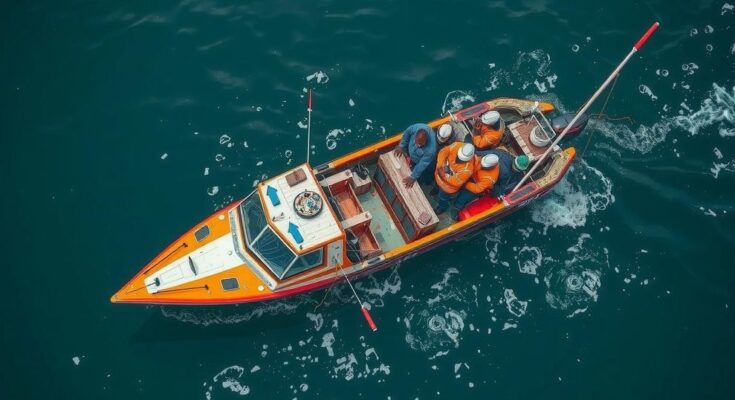A boat accident on Nigeria’s River Niger has led to the recovery of at least 54 bodies, with many still missing. The vessel capsized while en route from Kogi state to Niger state, reportedly overloaded with more than 200 passengers, including market traders and farm laborers. Authorities face challenges in recovery efforts due to a lack of passenger records, and safety regulations continue to be overlooked despite recommendations.
In Kogi state, Nigeria, a tragic incident occurred on the River Niger where a boat carrying over 200 passengers capsized during the early hours of Friday. As reported by local authorities, at least 54 bodies have been recovered, while many others are still unaccounted for. Twenty-four survivors have been rescued, some of whom remain hospitalized. Recovery efforts continue, but hopes of finding more survivors are dwindling. This unfortunate event marks another chapter in Nigeria’s troubling history of inland waterway accidents, where safety regulations are frequently ignored despite recommendations. The boat was en route to a weekly market in Niger state, with many traders and farm laborers on board. The exact cause of the accident has yet to be determined; however, it appears that several passengers were not wearing life jackets, as mandated by safety guidelines. The absence of a passenger manifest complicates the situation, making it challenging to ascertain the total number of individuals on board. Kogi state’s Governor, Usman Ododo, has directed hospitals to provide comprehensive care for the survivors, including food, while advocating for stricter enforcement of safety measures to prevent future occurrences. This incident marks the third major boat accident in Nigeria within the last 60 days, following another capsizing that resulted in the deaths of nearly 200 people and a recent collision in Delta state that claimed five lives.
The persistent problem of boat accidents in Nigeria reflects a larger issue of inadequate safety measures along its extensive inland waterways. Despite numerous warnings and safety recommendations, proper adherence remains alarmingly low. In recent weeks, boat capsizes have led to significant casualties, with governmental and emergency agencies struggling to keep accurate passenger records, thereby complicating rescue and recovery operations. Navigating this crisis requires addressing systemic lapses in accountability and enforcement of safety protocols to protect vulnerable travelers, particularly those relying on boats for transportation and economic activities, such as market trading.
The recent boat capsizing in Nigeria underscores the urgent need for improved safety standards on the country’s waterways. With dozens still missing and over 50 confirmed dead, the tragedy not only highlights the immediate loss of life but also reflects broader systemic issues related to boat safety regulations and accountability. As Kogi state’s governor calls for better care for survivors and stricter enforcement of safety protocols, it is imperative that such measures translate into tangible actions to prevent future tragedies.
Original Source: www.bbc.com




